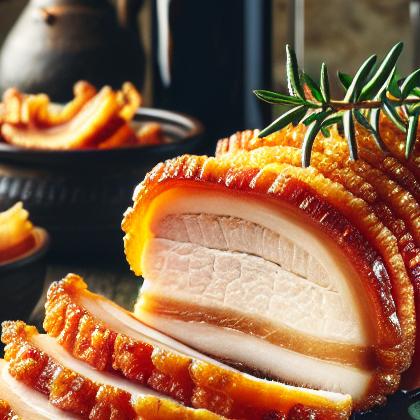Showing results for 'Pork crackling'
close
Pork Crackling

Pork rind is the skin (rind) of a pig. Pork rind is a common ingredient of sausages, which helps to improve their consistency. Fried or roasted pork rind and fat is also a snack. The frying renders much of the fat that is attached to the uncooked rind, causing the cooked product to reduce considerably in size. The product may be known by alternative names, such as pork scratchings or pork crackling in the UK, although the term crackling may also refer to the rind atop a roasted pork joint.
Pork crackling Pairs With:
Food Item
Flavor Affinity Level
Pork crackling Properties:
| Food Property | Type | Description |
|---|---|---|
| Flavor Profile | Salty | Pork crackling is characterized by its salty flavor, which is derived from the salt used in the cooking process. |
| Nutritional Value | Macronutrients | Pork crackling is high in fat and protein, making it a rich and satisfying snack or topping. |
| Micronutrients | Pork crackling contains micronutrients such as iron, zinc, and vitamin B12, which are important for overall health. | |
| Color | Maillard Reaction | Pork crackling develops a golden-brown color due to the Maillard reaction, which occurs when proteins and sugars in the pork skin react at high temperatures. |
| Aroma | Volatile Compounds | Pork crackling has a rich and savory aroma, thanks to the volatile compounds released during the cooking process. |
| Cooking Behavior | Heat Conductivity | Pork crackling requires high heat conductivity to properly crisp up the pork skin and create the desired texture. |
| Oil Absorption | Pork crackling absorbs oil during the cooking process, which helps to create a crispy texture. |
Food Pairing App - Version 1.2.0
